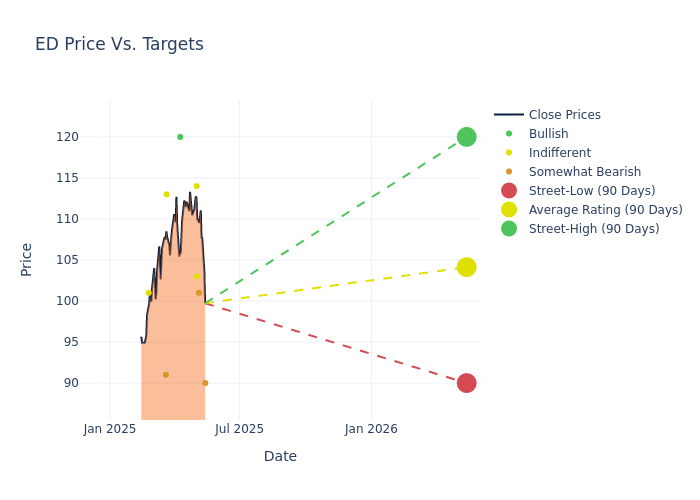Deep Dive Into Consolidated Edison Stock: Analyst Perspectives (11 Ratings)
Analysts' ratings for Consolidated Edison (NYSE:ED) over the last quarter vary from bullish to bearish, as provided by 11 analysts.
The following table summarizes their recent ratings, shedding light on the changing sentiments within the past 30 days and comparing them to the preceding months.
| Bullish | Somewhat Bullish | Indifferent | Somewhat Bearish | Bearish | |
|---|---|---|---|---|---|
| Total Ratings | 1 | 0 | 5 | 5 | 0 |
| Last 30D | 0 | 0 | 0 | 1 | 0 |
| 1M Ago | 0 | 0 | 2 | 2 | 0 |
| 2M Ago | 1 | 0 | 1 | 1 | 0 |
| 3M Ago | 0 | 0 | 2 | 1 | 0 |
The 12-month price targets assessed by analysts reveal further insights, featuring an average target of $103.45, a high estimate of $120.00, and a low estimate of $90.00. Surpassing the previous average price target of $100.20, the current average has increased by 3.24%.

Breaking Down Analyst Ratings: A Detailed Examination
The perception of Consolidated Edison by financial experts is analyzed through recent analyst actions. The following summary presents key analysts, their recent evaluations, and adjustments to ratings and price targets.
| Analyst | Analyst Firm | Action Taken | Rating | Current Price Target | Prior Price Target |
|---|---|---|---|---|---|
| Sophie Karp | Keybanc | Announces | Underweight | $90.00 | - |
| Nicholas Campanella | Barclays | Raises | Underweight | $101.00 | $100.00 |
| Sarah Akers | Wells Fargo | Raises | Equal-Weight | $114.00 | $103.00 |
| Shahriar Pourreza | Guggenheim | Raises | Neutral | $103.00 | $96.00 |
| Nicholas Campanella | Barclays | Raises | Underweight | $100.00 | $95.00 |
| Ryan Levine | Citigroup | Raises | Buy | $120.00 | $116.00 |
| William Appicelli | UBS | Raises | Neutral | $113.00 | $110.00 |
| David Arcaro | Morgan Stanley | Raises | Underweight | $91.00 | $85.00 |
| William Appicelli | UBS | Raises | Neutral | $110.00 | $105.00 |
| Andrew Weisel | Scotiabank | Raises | Sector Perform | $101.00 | $100.00 |
| Nicholas Campanella | Barclays | Raises | Underweight | $95.00 | $92.00 |
Key Insights:
- Action Taken: In response to dynamic market conditions and company performance, analysts update their recommendations. Whether they 'Maintain', 'Raise', or 'Lower' their stance, it signifies their reaction to recent developments related to Consolidated Edison. This insight gives a snapshot of analysts' perspectives on the current state of the company.
- Rating: Offering a comprehensive view, analysts assess stocks qualitatively, spanning from 'Outperform' to 'Underperform'. These ratings convey expectations for the relative performance of Consolidated Edison compared to the broader market.
- Price Targets: Analysts navigate through adjustments in price targets, providing estimates for Consolidated Edison's future value. Comparing current and prior targets offers insights into analysts' evolving expectations.
Understanding these analyst evaluations alongside key financial indicators can offer valuable insights into Consolidated Edison's market standing. Stay informed and make well-considered decisions with our Ratings Table.
Stay up to date on Consolidated Edison analyst ratings.
Unveiling the Story Behind Consolidated Edison
Con Ed is a holding company for Consolidated Edison of New York, or CECONY, and Orange & Rockland, or O&R. These utilities provide steam, natural gas, and electricity to customers in southeastern New York - including New York City and small parts of New Jersey. The two utilities generate nearly all of Con Ed's earnings following the sale of its clean energy business to RWE in early 2023.
Consolidated Edison: A Financial Overview
Market Capitalization Analysis: With a profound presence, the company's market capitalization is above industry averages. This reflects substantial size and strong market recognition.
Revenue Growth: Consolidated Edison displayed positive results in 3M. As of 31 March, 2025, the company achieved a solid revenue growth rate of approximately 12.1%. This indicates a notable increase in the company's top-line earnings. In comparison to its industry peers, the company stands out with a growth rate higher than the average among peers in the Utilities sector.
Net Margin: Consolidated Edison's financial strength is reflected in its exceptional net margin, which exceeds industry averages. With a remarkable net margin of 16.49%, the company showcases strong profitability and effective cost management.
Return on Equity (ROE): Consolidated Edison's financial strength is reflected in its exceptional ROE, which exceeds industry averages. With a remarkable ROE of 3.46%, the company showcases efficient use of equity capital and strong financial health.
Return on Assets (ROA): Consolidated Edison's ROA surpasses industry standards, highlighting the company's exceptional financial performance. With an impressive 1.12% ROA, the company effectively utilizes its assets for optimal returns.
Debt Management: Consolidated Edison's debt-to-equity ratio is below the industry average at 1.1, reflecting a lower dependency on debt financing and a more conservative financial approach.
What Are Analyst Ratings?
Analysts are specialists within banking and financial systems that typically report for specific stocks or within defined sectors. These people research company financial statements, sit in conference calls and meetings, and speak with relevant insiders to determine what are known as analyst ratings for stocks. Typically, analysts will rate each stock once a quarter.
Analysts may supplement their ratings with predictions for metrics like growth estimates, earnings, and revenue, offering investors a more comprehensive outlook. However, investors should be mindful that analysts, like any human, can have subjective perspectives influencing their forecasts.
Which Stocks Are Analysts Recommending Now?
Benzinga Edge gives you instant access to all major analyst upgrades, downgrades, and price targets. Sort by accuracy, upside potential, and more. Click here to stay ahead of the market.
This article was generated by Benzinga's automated content engine and reviewed by an editor.